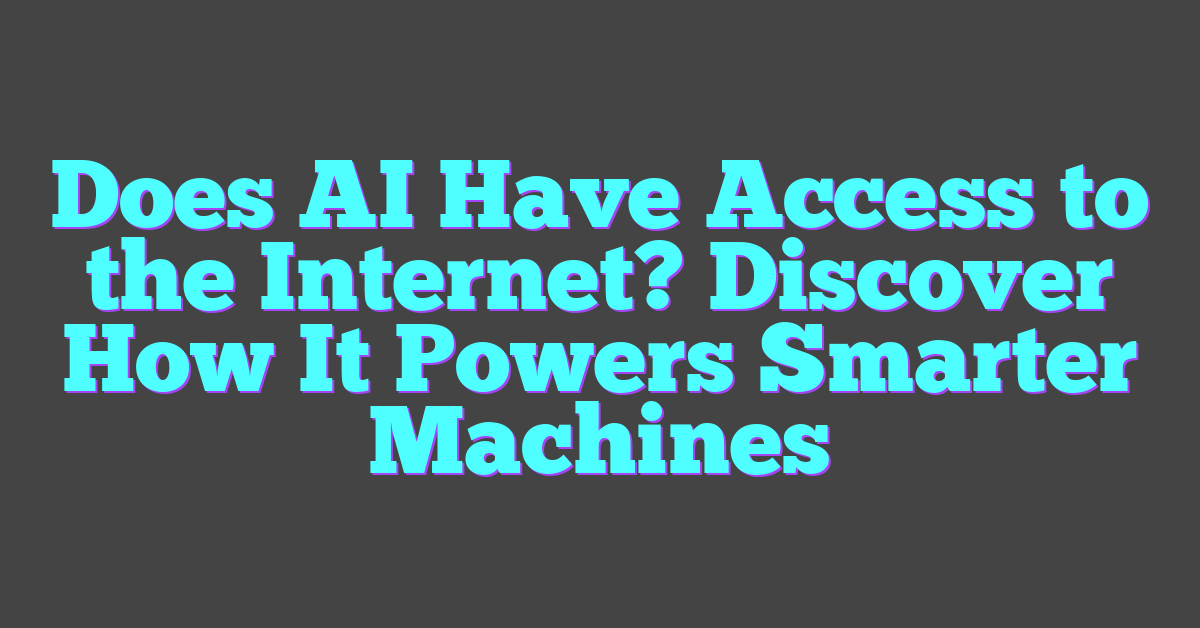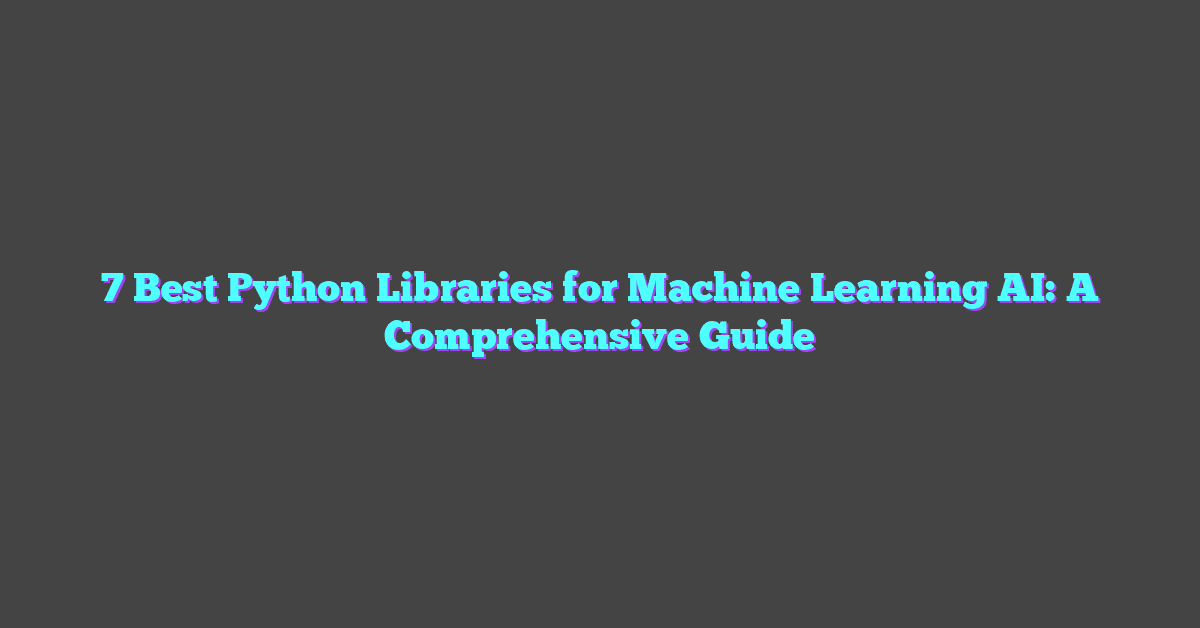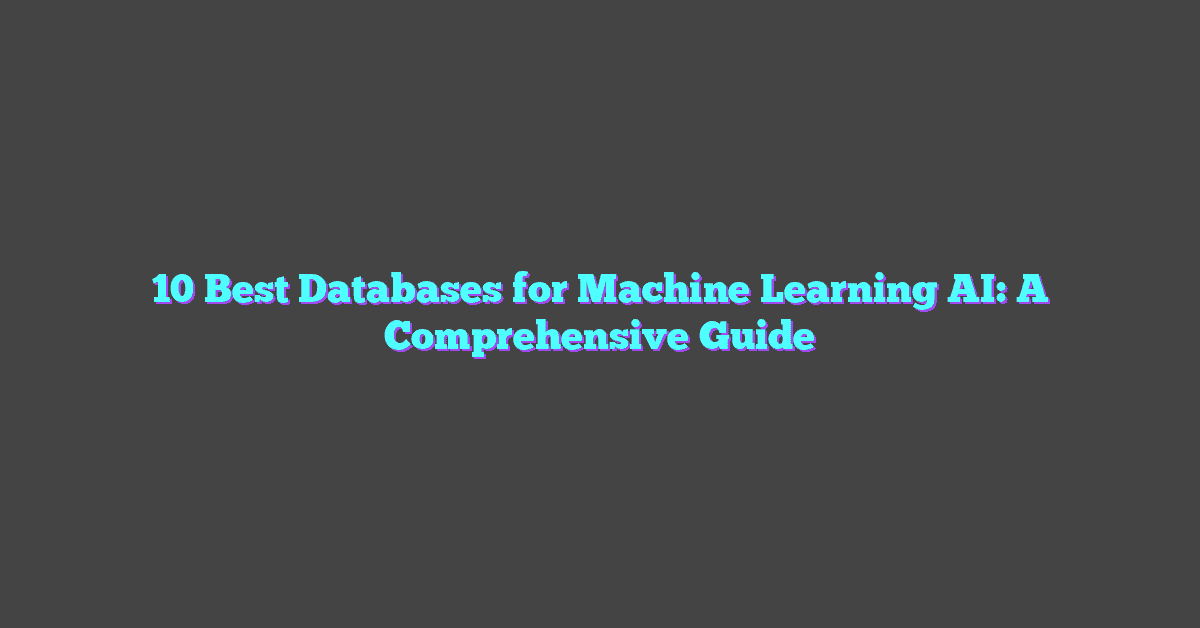Ever wondered if artificial intelligence (AI) can just hop online and browse the web like we do? It’s a fascinating question that dives deep into the capabilities and limitations of modern AI. While it might seem like a straightforward yes or no, the answer is a bit more nuanced.
AI systems, especially those designed for specific tasks, often rely on vast amounts of data to function. But does that mean they have unrestricted access to the internet? Understanding how AI interacts with the web can shed light on its potential and the boundaries set to ensure safety and privacy. Let’s explore this intriguing topic and uncover the truth behind AI’s internet access.
Understanding AI and Internet Access
What Is AI?
Artificial intelligence, often abbreviated as AI, refers to systems or machines that mimic human intelligence. These systems are designed to learn, reason, perceive, and interact. AI involves several subfields, including machine learning, which allows systems to learn from data and improve over time.

How AI Interacts With Data
AI relies on vast amounts of data to function effectively. It processes this data to make predictions, decisions, and recommendations. Machine learning algorithms analyze data patterns and extract meaningful insights. This process enables AI to find trends, identify anomalies, and generate accurate forecasts.
AI systems access data from various sources, often including datasets accessible through the internet. These sources can include public datasets, APIs, or crawled web content. By interacting with such diverse data sources, AI systems can offer enhanced services like personalized recommendations, real-time analytics, and dynamic content generation.
Exploring the Extent of Internet Access in AI Systems
AI systems rely on internet access to tap into the vast amount of information available online. They perform tasks more effectively by leveraging real-time data and diverse sources. This section explores how various AI applications utilize the internet and the mechanisms in place to regulate their access.
Examples of AI With Internet Access
- Personal Assistants: AI systems like Siri, Alexa, and Google Assistant access the internet to provide weather updates, answer queries, and control smart home devices.
- Chatbots: Customer service chatbots utilize internet databases to respond to customer queries, providing instant and accurate information.
- Recommendation Engines: Streaming services like Netflix and Spotify use AI to analyze user preferences and internet data to deliver personalized content recommendations.
- Search Engines: Google Search employs AI algorithms to crawl and index the web, delivering the most relevant search results based on user input.
- Language Translation: Tools like Google Translate access vast linguistic data online to provide accurate translations in real time.
Limitations and Control Mechanisms
AI systems face limitations and constraints to ensure ethical and safe usage. These mechanisms include:
- Data Privacy Regulations: Legal frameworks like GDPR restrict AI’s access to personal data, protecting user privacy.
- Security Protocols: Firewalls and encryption techniques prevent unauthorized access by AI systems, ensuring data security.
- Access Controls: Role-based access controls (RBAC) define the level of internet access AI systems can have, limiting exposure to sensitive information.
- Ethical Guidelines: Organizations establish ethical guidelines to prevent AI from accessing harmful or biased data.
- Throttling Mechanisms: Rate limiting prevents AI systems from overloading servers or monopolizing bandwidth, maintaining internet stability.
The Impact of Internet Access on AI Capabilities
AI’s access to the internet significantly enhances its capabilities, including learning, adaptability, and addressing ethical concerns.
Enhancing AI Learning and Adaptability
Access to the internet supercharges AI’s learning and adaptability. AI systems can tap into vast amounts of real-time data, enabling machine learning models to refine their algorithms continuously. For instance, language models like GPT-3 frequently update their vocabulary and contextual understanding by analyzing newly available text forms online. Weather prediction models improve accuracy by incorporating up-to-date meteorological information from various global sources.
Risks and Ethical Concerns
While the benefits are substantial, internet access for AI systems brings risks and ethical concerns. Security vulnerabilities can expose sensitive data or lead to unauthorized actions by AI-powered applications. Ensuring robust authentication mechanisms protects against breaches. Ethical concerns include data privacy, where AI’s data collection needs strict adherence to guidelines like GDPR. Additionally, biases propagate if AI systems ingest skewed or unrepresentative internet data, making diversity in training datasets crucial.
Effective controls and ethical guidelines help mitigate these risks, enabling safer and more reliable AI applications.
Regulatory and Ethical Considerations
Regulating AI’s access to the internet involves addressing complex governance and ethical issues. This ensures AI operates within safe, ethical boundaries and respects privacy.
Governing Internet Use in AI
Governance of AI internet use is critical for maintaining public trust. Regulatory bodies such as the European Union’s GDPR and the U.S. Federal Trade Commission enforce guidelines on how AI systems utilize internet data. These regulations mandate transparency in data usage, ensuring users know how their data gets processed.
For instance, AI systems must comply with data retention policies, safeguarding sensitive information. Governments and organizations also implement access controls, restricting AI systems’ capability to access certain types of data, minimizing risks of misuse.
Maintaining Privacy and Security
AI’s reliance on vast internet data necessitates stringent privacy and security measures. Encryption protocols protect data during transmission, ensuring it isn’t intercepted or altered by malicious entities. AI developers adopt techniques like differential privacy, which allows systems to learn from data without exposing individual information.
Additionally, routine security audits identify vulnerabilities within AI systems, ensuring robust defenses against cyber threats. Ethical AI practices also involve mitigating biases sourced from skewed internet data, fostering fair, unbiased decision-making.
Conclusion
AI’s access to the internet is a double-edged sword. On one hand, it empowers AI to learn, adapt, and provide valuable services. On the other, it raises significant ethical, privacy, and security concerns. As AI continues to evolve, striking a balance between leveraging internet data and maintaining robust control mechanisms is crucial. With ongoing advancements and regulatory efforts, the future of AI looks promising, provided it operates within ethical boundaries. Ultimately, responsible internet access will be key to harnessing AI’s full potential while safeguarding public trust.
Frequently Asked Questions
Why is internet access important for AI systems?
Internet access is crucial for AI systems because it provides extensive data, enabling them to function effectively by learning, adapting, and improving their functionalities.
How does AI mimic human intelligence?
AI mimics human intelligence through machine learning, where systems process and analyze data to make decisions and perform tasks similar to humans.
What are common AI applications that require internet access?
Common AI applications that require internet access include personal assistants, chatbots, recommendation engines, search engines, and language translation tools.
What measures ensure ethical and safe usage of AI systems?
Measures include data privacy regulations, security protocols, access controls, ethical guidelines, and throttling mechanisms to ensure AI systems are used ethically and safely.
How does internet access enhance AI capabilities?
Internet access enhances AI capabilities by providing vast real-time data, improving their learning and adaptability, with examples like updating vocabularies in language models and enhancing weather prediction accuracy.
What regulations govern AI’s use of internet data?
Regulatory bodies such as the European Union’s GDPR and the U.S. Federal Trade Commission enforce guidelines on how AI systems utilize internet data, ensuring transparency and data protection.
What privacy and security measures are vital for AI systems?
Privacy and security measures vital for AI systems include encryption protocols, differential privacy techniques, routine security audits, and bias mitigation to maintain ethical practices and public trust.




